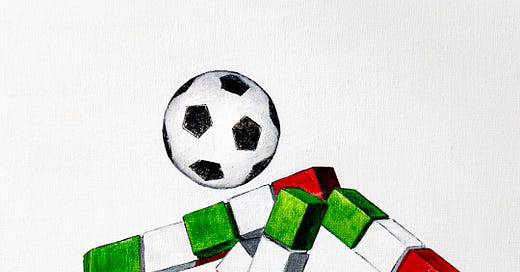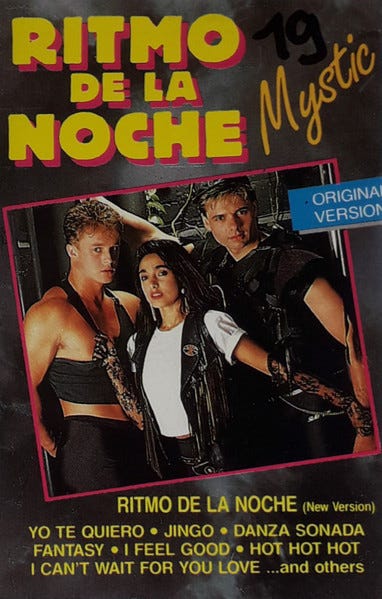Italia 90
One of my favourite books as a boy was Peter Everett’s You’ll Never Be Sixteen Again - a brilliant history of post-war British youth culture documenting the decades from the rationing years through to early Thatcher, mainly relying on featured quotes from witnesses which summed up the mood of the time. It is a real shame the book was never updated to include the late 80s and early 90s, an incredibly exciting period in pop culture which I’m not sure has ever been surpassed. The bias of subjectivity will probably rear its head here but there was something uniquely special about 1990 in particular which I’ve never been properly able to explain. But I’ll have a go.
I turned 15 in January 1990. It had been an unhappy period at school. My voice broke long after most of the others in my year. Some of my teachers were borderline fascistic (making us run across Hammersmith Bridge and back in the freezing cold and AGAIN if we were too slow). Everything was a bit of a struggle. I rarely left the house at the weekend. My tin(n)y Sanyo one cassette deck radio was a lifeline. Big things were happening all around but they seemed far off, distant and abstract to someone in SW London. Of course, there was a lot of feverish talk about Thatcher nearing the political end, and Eastern Europe and South Africa finally tasting freedom, along with endless demos and riots, but none of it seemed to have any direct impact on us. My parents loathed each other. Everyone hated the dog. The boredom was suffocating. My only real exposure to the world was the Sunday papers or the Hot Mix on Capital Radio at the weekends.
The music, the clothes and the culture around it was all a mystery. I had no understanding of what any of it meant or why the sixth form had spent much of the previous year wearing yellow smiley badges. The charts were ablaze with exciting music - Adamski, Beats International, Snap, Soul II Soul, Chad Jackson along with endless others who disappeared with the same haste with which they had arrived – Massivo featuring Tracy, Alyson Williams, Ya Kid K, Maureen, MC Eric, Soup Dragons, The Times, Blue Pearl, Partners in Kryme. Many of these would appear on cassette compilations with titles like The Right Stuff 2 or Deep Heat 8, usually released by Telstar, with swirling images on the cover, probably printed off on the cheap and in a hurry. On TV, programmes like Dance Energy and anything on Def II offered a far cooler alternative to the increasingly peculiar clash of cultures taking place on Top of the Pops.
School was heavily segregated into yoof tribes. Some kids would evangelise about De La Soul’s brand of positive hip hop. Others defined themselves by who they weren’t. The moody indie set had little to do with the dance crowd although much of the new music seemed to blur the two. There seemed to be a lot of sixties flavoured drippy indie around from the North, which sounded pretty painful to my ears – although that didn’t stop me acquiring an overpriced, overstocked (and oversized) printed hooded tshirt (cape? poncho?) from the discount store on Twickenham High Street – an item of clothing which never even made it to the washing machine. “You’re NOT wearing THAT”.
My epiphany arrived in the summer. We had some exchange students staying with us (those foreign kids who would take over tube carriages or Brighton Pier in matching fluorescent backpacks) and I mysteriously found myself invited to a riverboat party in Richmond hosted by the language school, one of those outfits that European parents farm their offspring out to each summer in the vain hope they will learn some English (an ambitious plan for young Italians who automatically gravitate to other young Italians). I was reticent because the Italy-Argentina semi-final was on the same night but seeing as I knew most of the exchange students were Italian, there HAD to be a tv/radio on board.
It is easy to forget the football in all this. I was obsessed with the World Cup in the 80s. It contrasted with the overt nastiness within the English game by offering a festival of haircuts, comedy spats and foreign names which were invariably exotic to a pre-globalised audience. Emotionally I had rarely seen anyone on British (or should I say English) television capture the national mood so movingly as Des Lynam. In my head (if not on the BBC) the music I heard that summer tied in with Italia '90 and I turned into an obsessive italophile.
I became penfriends with one of those exchange students and swapped postcards until I tired of rooftop views of Trieste. I loved that World Cup, not for the football itself which was incidental but for the camp sideshows and subplots, the high emotions, bile and spit(e), the contributions of New Order & John Barnes and of course Luciano Pavarotti, seemingly achieving the impossible with Nessun Dorma and sending classical music into the charts; a song with such universal appeal, I could still hear it at Sa Trinxa (Ibiza) 25 years later.
I had loved El Naranjito in 1982 and Maradona's evil genius in 86 (I was obsessed with Maradona) although I would go on to root for the Cameroon team in 1990 until the English eliminated them. If Italia ‘90 didn't match up to España ‘82 and Mexico ‘86 in terms of quality, it certainly compensated in terms of melodrama, comedy and high farce - and that was reflected in the FOOTBALL MUSIC of that summer.
After Argentine keeper Goycochea broke their hearts, the Italian exchange students on the boat all drowned their sorrows on soft drinks, whilst I went down to the lower deck where the DJ (probably some local mobile DJ) was playing the big Italian records of the time (49ers girl to girl, Manic MCs mental, FPI Project rich in paradise) to a deserted floor. I was intrigued. I was beguiled. I was converted. Listening to the le freak b-side of Black Box everybody, everybody last week for the first time in a long time, I was struck by the uplifting organ sound, the cheesy nods to disco, pop and more serious US house, a common trait in all that music. It is a fantastic record which will outlive us all. Black Box brainchild Daniele Davoli was a genius - and arguably the coolest Italian on the planet (aside perhaps from Toto Schillachi).
Thereafter, it became my quest to track down this music wherever I could. The DFC record label was a goldmine. Every record seemed to epitomise the optimism of that summer, Somnabulism, Hazme Soñar, and none more so than Sueño Latino with its Manual Göttsching sample and endless derivatives. The ever-present loon bird sound. Everywhere from Rimini to 808 State.
Interestingly, Italian pianos soon petered out in the UK (or at least became absorbed in ever faster rave records, where the original charm was bludgeoned to oblivion). In (mainland) Spain however, Italian house soldiered on through till around 1992. Perhaps the last major release was the MTL Project cover of Yello's Vicious Games. Thereafter it was eurodance all the way. The record which best defined the Spanish scene was probably Mystic ritmo de la noche, which I seemed to hear everywhere. This had it all, the clapping, the simple anodyne chorus and the mother of all piano riffs. The overall melody was pilfered from the Barry Manilow-esque I go to Rio by Peter Allen. The point about Mystic was that it became an instant classic in all the bars/clubs/street events, from cheesy provincial carpas through to the most exclusive clubs.
Evidently oblivious to what was concurrently happening in the discos or the warehouses or the fields or in the opulent temples of Ibiza (see A Short Film About Chilling ), my musical experiences in 1990 were mostly consumed vicariously thousands of miles away. I think I became a bit more self-aware when some nerdy kid in my year who lived opposite me on the South Circular Road invited me round, ostensibly to hear the new Happy Mondays album, but then he insisted on playing Dungeons & Dragons with his friends. Staring at the strange-shaped dice, I had an inkling that this was more about wargames than No Alla Violenza or The Second Summer of Love. But then again plenty of folk didn't buy into the mythology. Elton John's Sacrifice was the Mull of Kintyre of that summer, clinging obstinately to the top of the charts, a ready reminder that not everyone got the memo.
I suppose this is really a comment about being an only child at 15, not knowing that many people and looking in from the outside and trying to make sense of it all. Romanticising the music, the football, Italy and all that bound them.. Years later, I would research all the music and the politics and piece together the strands that wove this myriad of genres and subcultures together but at that age, I had absolutely no idea. It all felt so honest, naïve and innocent (although I am sure someone made money out of it). Nobody knew the rules because there were none. As anyone who was ever a teenager will testify, nothing will ever quite match those formative experiences. I can’t pretend to have ‘been there’ at the time but in my own way I feel like I was.





